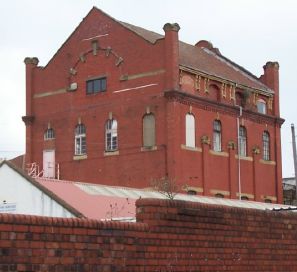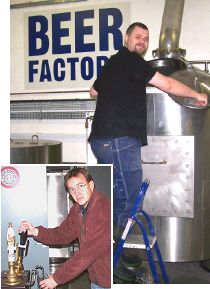 |
 |
|

|
|

|
 |
home
about
Protz
features
A-Z
books
|
|
Protz:
features
reviews
tastings
news & events
books
|

| |
Sunshine & smiles at The Beer Factory
by Willard Clarke, 06/05
Bristol lost its historic George�s Brewery in 1999 when Scottish Courage axed it. George�s dated from the 1730s when it was first called the Bristol Porter Brewery and attempted, with some success, to compete
with the London brewers in selling porter to Ireland.
Philip George bought the brewery in 1788 and expanded sales in the West of England as well as Ireland. Bristol�s wealth had been built on the slave trade and, when that vile
practice was abolished, brewing and the exporting of beer became important parts of the city's new economy.

|
|
The tradition of big commercial brewing was ripped out of the city when ScotCo closed George's, a dedicated cask ale plant. Then, to rub salt into the wound, Smiles, the long-running Bristol independent,
went out of business. But a new brewery has appeared. The Beer Factory is based in part of the premises of the long defunct Ashton Gate Brewery, which was taken over and closed by George's in 1933.
Ashton Gate was once home to the giant Wills Tobacco empire. Its redbrick factories and warehouses still dominate the area but are used now as industrial units. |
One part of the site has been bought by George Ferguson, president of RIBA, the Royal Institute of British Architects. Ferguson�s Tobacco Factory complex includes a restaurant, caf� bar, gym and theatre, which will be supplied by the Beer Factory, of which he is one of the partners.
The Ashton Gate Brewery was a sizeable company and its redbrick tower still stands sentinel over the site. Thomas Baynton opened the brewery in the 1830s or 40s and in 1865 it became one of the first limited liability companies in Britain. By the early part of the 20th century it sold its beers as the Sunrise Brands with the slogan �Outshines Them All�.
The Sunshine brands included PA (Pale Ale), AG (Ashton Gate), IPA and MS, which stood for Milk Stout. The label for the last name showed a cow being milked and carried the promise �10 ozs of pure dairy milk�. This was seriously misleading, as milk stout is made with lactose, not pure milk. George�s continued to use the label when it took over Ashton Gate but had to drop the reference to pure milk following World War Two, when the government clamped down on dubious nutritional claims at a time of severe food shortages.
Simon Bartlett (bottom left), is one of two employees at the Beer Factory. He took me on a tour of the old brewery site. The large empty and echoing rooms once held mash tuns, coppers and malt and hop stores. Ashton Gate used the �double drop� method of fermentation, still in use at Brakspear, with two banks of vessels. After a few days in the top bank, the fermenting beer was dropped into the vessels below, leaving behind dead yeast cells and protein and encouraging a cleaner and faster ferment.
Simon is one of the partners in the new brewery, which occupies part of the ground floor of Ashton Gate. He is an engineer by profession and has worked in breweries in Britain and abroad, including Russia. He can
turn his hand to brewing when required, but the full-time brewer is Chris Thurgeson (top right), who worked for Smiles for five years. |
|

|
Most of the 10-barrel stainless steel kit came from the former Bristol Brewing Co site that opened in 2002 but failed to survive: the new company is officially known as the Bristol Brewing Co but trades as the Beer Factory. The two fermenters were part of the original Bath Ales plant.
Malts come from Muntons but supplies will be switched to Warminster, which is closer to Bristol. Hops are supplied by Charles Faram and include Challenger, First Gold, Fuggles and Pioneer. Chris Thurgeson uses the Smiles house yeast culture, which is well travelled in Bristol, as it originated at George�s. Brewing water is hard and comes from reservoirs in the Mendip Hills.
Three beers are produced:
Beer Factory No 7
This 4.2% ABV deep bronze bitter was first brewed in July, the seventh month, 2004. It uses Maris Otter pale malt, crystal malt and wheat and is hopped with Challenger and Fuggles. It has a distinctive aroma of
vinous fruit and hop resins, with bitter hops, biscuity malt and tart fruit in the mouth, and a long fruity (apricots?) finish balanced by rich malt and bitter hops.
Beer Factory Gold
Gold has 5% ABV and is pale bronze, brewed with Maris Otter pale malt and carapils, a continental version of stewed crystal malt. Only one hop, Pioneer, is used: Chris and Simon are considering dry hopping to
achieve more aroma but I delighted in the existing beer, with a citrus hop nose balanced by sappy malt, with bitter hop resins, tangy fruit and juicy malt in the mouth, and a luscious bitter-sweet finish that
becomes dry, bitter and fruity.
Beer Factory Red
At 3.8% ABV, this is the latest addition to the range: a beer of a different colour and designed as a traditional malty Bristol brew. It has a complex recipe of pale, crystal, chocolate and wheat malts. First Gold
hops are used in the copper boil but no late hopping is used: �I wanted a malty beer with a big mouthfeel,� Chris explained. The rich aroma is reminiscent of sultana fruit with a big malt loaf note. A
digestive biscuity maltiness fills the mouth with dried fruit and a light hint of hops. The finish continues the malt loaf and vine fruits character, with a gentle underpinning of hops.
You will find the beers on sale at the Tobacco Factory and the two remaining Smiles Pub Co outlets in Bristol. Expansion will come, as the Beer Factory is a member of the Society of Independent Brewers and should get entr�e into Enterprise and Unique pubs in the area as a result of SIBA�s direct delivery scheme.
With a branch of the Zerodegrees brew-restaurant chain winning plaudits in the city centre, brewing in Bristol is rising from the ashes as well as Ashton Gate.
Bristol Brewing Co
The Beer Factory
Unit A, The Old Brewery
Durnford Street
Ashton Gate
Bristol B33 2AW.
Tel: 0117 902 6317.
|
|
home
about
Protz
features
A-Z
books
|